高中英语动词的时态和语态教案
- 格式:doc
- 大小:40.44 KB
- 文档页数:11
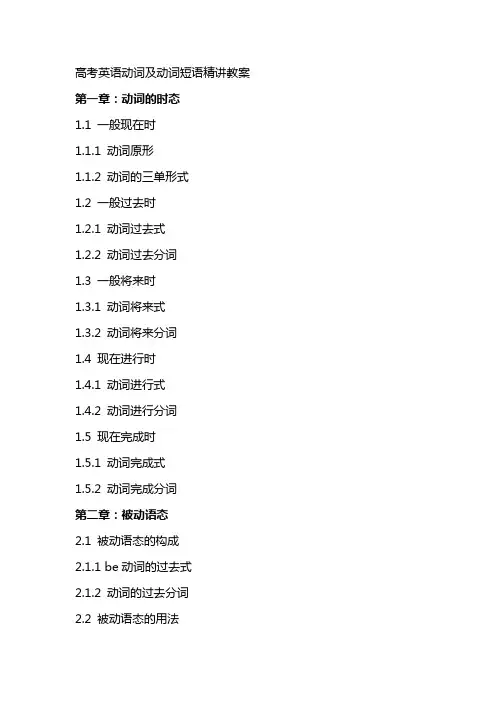
高考英语动词及动词短语精讲教案第一章:动词的时态1.1 一般现在时1.1.1 动词原形1.1.2 动词的三单形式1.2 一般过去时1.2.1 动词过去式1.2.2 动词过去分词1.3 一般将来时1.3.1 动词将来式1.3.2 动词将来分词1.4 现在进行时1.4.1 动词进行式1.4.2 动词进行分词1.5 现在完成时1.5.1 动词完成式1.5.2 动词完成分词第二章:被动语态2.1 被动语态的构成2.1.1 be动词的过去式2.1.2 动词的过去分词2.2 被动语态的用法2.2.1 表达动作的承受者2.2.2 强调动作的承受者2.3 被动语态的转换2.3.1 将主动语态转换为被动语态2.3.2 将被动语态转换为主动语态第三章:情态动词3.1 can和may3.1.1 表示能力3.1.2 表示请求3.2 must和have to3.2.1 表示必须3.2.2 表示需要3.3 shall和will3.3.1 表示承诺3.3.2 表示意愿3.4 should和ought to3.4.1 表示应该3.4.2 表示建议第四章:动词短语4.1 动词+副词4.1.1 举例:look after,run quickly 4.2 动词+介词4.2.1 举例:put on,go to4.3 动词+名词4.3.1 举例:make a decision,take a picture 4.4 动词+动词4.4.1 举例:try to do,help with第五章:动词辨析5.1 动词词义辨析5.1.1 举例:see-watch,read-study5.2 动词搭配辨析5.2.1 举例:make-have,get-obtn5.3 动词时态辨析5.3.1 举例:go-went,do-did第六章:动词的语态6.1 主动语态6.1.1 动词原形6.1.2 动词的进行式6.2 被动语态6.2.1 be动词的过去式6.2.2 动词的过去分词6.3 语态的转换6.3.1 主动语态转换为被动语态6.3.2 被动语态转换为主动语态第七章:情态动词的用法7.1 can和may7.1.1 表示能力7.1.2 表示请求7.2 must和have to7.2.1 表示必须7.2.2 表示需要7.3 shall和will7.3.1 表示承诺7.3.2 表示意愿7.4 should和ought to7.4.1 表示应该7.4.2 表示建议第八章:动词短语的辨析8.1 动词+副词8.1.1 举例:look after,run quickly8.2 动词+介词8.2.1 举例:put on,go to8.3 动词+名词8.3.1 举例:make a decision,take a picture 8.4 动词+动词8.4.1 举例:try to do,help with第九章:动词辨析与应用9.1 动词词义辨析9.1.1 举例:see-watch,read-study 9.2 动词搭配辨析9.2.1 举例:make-have,get-obtn 9.3 动词时态辨析9.3.1 举例:go-went,do-did9.4 动词在特定语境中的应用9.4.1 举例:put off,make up第十章:动词综合练习10.1 动词填空练习10.1.1 选择合适的动词形式填空10.1.2 根据语境选择正确的动词时态10.2 动词短语选择练习10.2.1 根据语境选择合适的动词短语10.2.2 改写句子,使用不同的动词短语10.3 动词辨析练习10.3.1 选择正确的动词10.3.2 根据语境选择合适的动词形式第十一章:动词与介词的搭配11.1 常见介词与动词的搭配11.1.1 举例:get up,put down11.2.1 表示位置关系11.2.2 表示动作方向11.3 动词与介词搭配的练习11.3.1 根据语境选择合适的介词11.3.2 完成句子,使用给定的动词和介词第十二章:动词与副词的搭配12.1 常见副词与动词的搭配12.1.1 举例:run quickly,speak loudly 12.2 动词与副词搭配的意义12.2.1 表示程度12.2.2 表示方式12.3 动词与副词搭配的练习12.3.1 根据语境选择合适的副词12.3.2 改写句子,使用不同的副词第十三章:动词与名词的搭配13.1 动词与名词搭配的类型13.1.1 动宾搭配13.1.2 动状搭配13.2 动词与名词搭配的意义13.2.1 表示动作的对象13.2.2 表示动作的状态13.3.1 根据语境选择合适的名词13.3.2 完成句子,使用给定的动词和名词第十四章:动词与形容词的搭配14.1 动词与形容词搭配的类型14.1.1 动词+形容词作宾语14.1.2 动词+形容词作状语14.2 动词与形容词搭配的意义14.2.1 表示主语的状态14.2.2 表示动作的特点14.3 动词与形容词搭配的练习14.3.1 根据语境选择合适的形容词14.3.2 改写句子,使用不同的形容词第十五章:动词综合应用15.1 动词在不同语境中的应用15.1.1 口语交流15.1.2 书面表达15.2 动词短语的创造性使用15.2.1 改写句子,使用不同的动词短语15.2.2 创作短文,运用所学动词和短语15.3 动词复习与测试15.3.1 完成填空题15.3.2 解答选择题重点和难点解析1. 动词的时态:一般现在时、一般过去时、一般将来时、现在进行时和现在完成时。
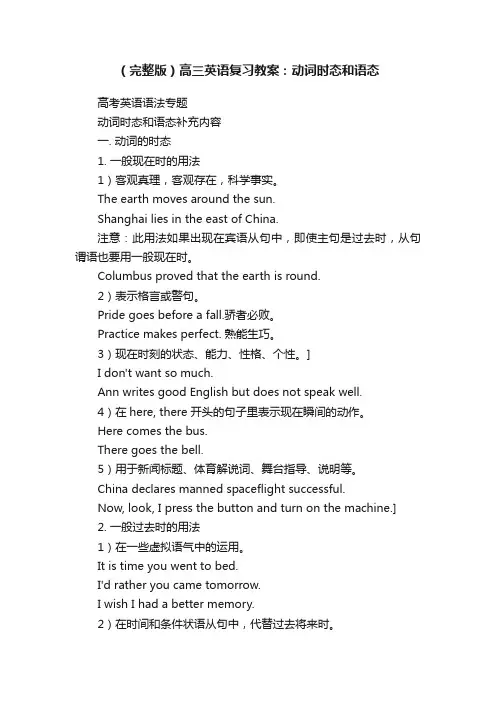
(完整版)高三英语复习教案:动词时态和语态高考英语语法专题动词时态和语态补充内容一. 动词的时态1. 一般现在时的用法1)客观真理,客观存在,科学事实。
The earth moves around the sun.Shanghai lies in the east of China.注意:此用法如果出现在宾语从句中,即使主句是过去时,从句谓语也要用一般现在时。
Columbus proved that the earth is round.2)表示格言或警句。
Pride goes before a fall.骄者必败。
Practice makes perfect. 熟能生巧。
3)现在时刻的状态、能力、性格、个性。
]I don't want so much.Ann writes good English but does not speak well.4)在here, there 开头的句子里表示现在瞬间的动作。
Here comes the bus.There goes the bell.5)用于新闻标题、体育解说词、舞台指导、说明等。
China declares manned spaceflight successful.Now, look, I press the button and turn on the machine.]2. 一般过去时的用法1)在一些虚拟语气中的运用。
It is time you went to bed.I'd rather you came tomorrow.I wish I had a better memory.2)在时间和条件状语从句中,代替过去将来时。
Mother said I couldn’t watch TV before my homework was finished.3)情态动词could, would表示委婉语气。
Could you lend me your bike?Would you help me?4) used to do/ wouldused to do “过去常常”,表示过去习惯性的动作或状态。
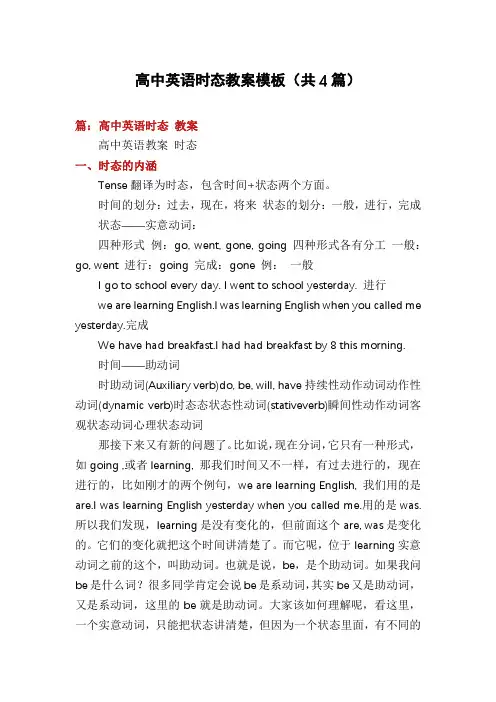
高中英语时态教案模板(共4篇)篇:高中英语时态教案高中英语教案时态一、时态的内涵Tense翻译为时态,包含时间+状态两个方面。
时间的划分:过去,现在,将来状态的划分:一般,进行,完成状态——实意动词:四种形式例:go, went, gone, going 四种形式各有分工一般:go, went 进行:going 完成:gone 例:一般I go to school every day. I went to school yesterday. 进行we are learning English.I was learning English when you called me yesterday.完成We have had breakfast.I had had breakfast by 8 this morning.时间——助动词时助动词(Auxiliary verb)do, be, will, have持续性动作动词动作性动词(dynamic verb)时态态状态性动词(stativeverb)瞬间性动作动词客观状态动词心理状态动词那接下来又有新的问题了。
比如说,现在分词,它只有一种形式,如going ,或者learning, 那我们时间又不一样,有过去进行的,现在进行的,比如刚才的两个例句,we are learning English, 我们用的是are.I was learning English yesterday when you called me.用的是was.所以我们发现,learning是没有变化的,但前面这个are, was是变化的。
它们的变化就把这个时间讲清楚了。
而它呢,位于learning实意动词之前的这个,叫助动词。
也就是说,be,是个助动词。
如果我问be是什么词?很多同学肯定会说be是系动词,其实be又是助动词,又是系动词,这里的be就是助动词。
大家该如何理解呢,看这里,一个实意动词,只能把状态讲清楚,但因为一个状态里面,有不同的时间,比如进行,有过去进行,现在进行,和将来进行,而实意动词本身不能把这个时间讲清楚,于是就借助于,求助于,助动词来帮忙,所以这个词就叫做助动词。
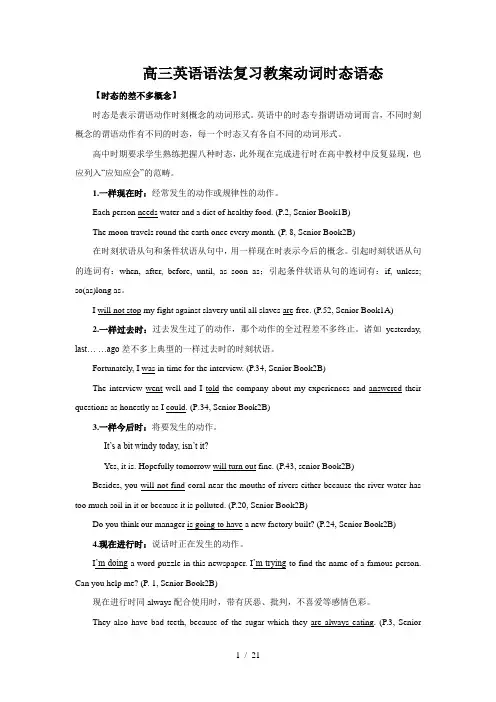
高三英语语法复习教案动词时态语态【时态的差不多概念】时态是表示谓语动作时刻概念的动词形式。
英语中的时态专指谓语动词而言,不同时刻概念的谓语动作有不同的时态,每一个时态又有各自不同的动词形式。
高中时期要求学生熟练把握八种时态,此外现在完成进行时在高中教材中反复显现,也应列入“应知应会”的范畴。
1.一样现在时:经常发生的动作或规律性的动作。
Each person needs water and a diet of healthy food. (P.2, Senior Book1B)The moon travels round the earth once every month. (P. 8, Senior Book2B)在时刻状语从句和条件状语从句中,用一样现在时表示今后的概念。
引起时刻状语从句的连词有:when, after, before, until, as soon as;引起条件状语从句的连词有:if, unless; so(as)long as。
I will not stop my fight against slavery until all slaves are free. (P.52, Senior Book1A)2.一样过去时:过去发生过了的动作,那个动作的全过程差不多终止。
诸如yesterday, last… …ago差不多上典型的一样过去时的时刻状语。
Fortunately, I was in time for the interview. (P.34, Senior Book2B)The interview went well and I told the company about my experiences and answered their questions as honestly as I could. (P.34, Senior Book2B)3.一样今后时:将要发生的动作。
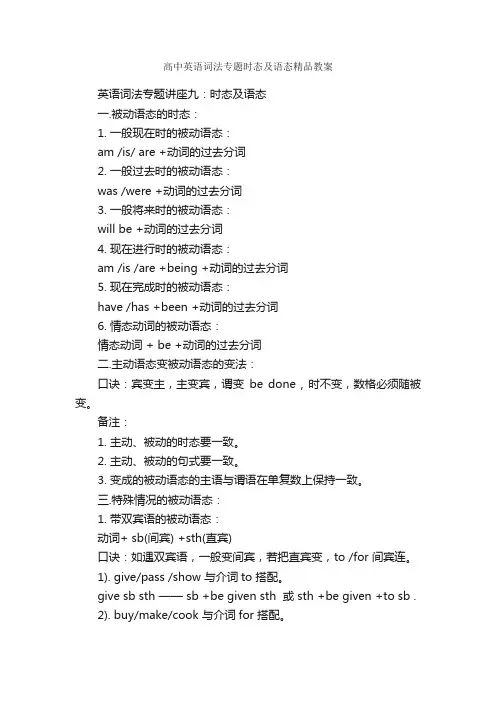
高中英语词法专题时态及语态精品教案英语词法专题讲座九:时态及语态一.被动语态的时态:1. 一般现在时的被动语态:am /is/ are +动词的过去分词2. 一般过去时的被动语态:was /were +动词的过去分词3. 一般将来时的被动语态:will be +动词的过去分词4. 现在进行时的被动语态:am /is /are +being +动词的过去分词5. 现在完成时的被动语态:have /has +been +动词的过去分词6. 情态动词的被动语态:情态动词 + be +动词的过去分词二.主动语态变被动语态的变法:口诀:宾变主,主变宾,谓变be done , 时不变,数格必须随被变。
备注:1. 主动、被动的时态要一致。
2. 主动、被动的句式要一致。
3. 变成的被动语态的主语与谓语在单复数上保持一致。
三.特殊情况的被动语态:1. 带双宾语的被动语态:动词+ sb(间宾) +sth(直宾)口诀:如遇双宾语,一般变间宾,若把直宾变,to /for 间宾连。
1). give/pass /show 与介词to 搭配。
give sb sth —— sb +be given sth 或 sth +be given +to sb .2). buy/make/cook 与介词for 搭配。
buy sb sth —— sb +be bought + sth 或 sth +be bought +for sbhe gave me a booki ______ ______ a book by him.a book ____ ____ _____ me by him .my mother made me a cake .i ____ _____ a cake by my mothera cake ____ ____ ____ me by my mother .2. 带省to 的不定式作宾补的被动语态:动词+ sb + do sth .口诀:感使动词真叫怪,to来to去记心怀,主动语态to离去,被动语态to回来。
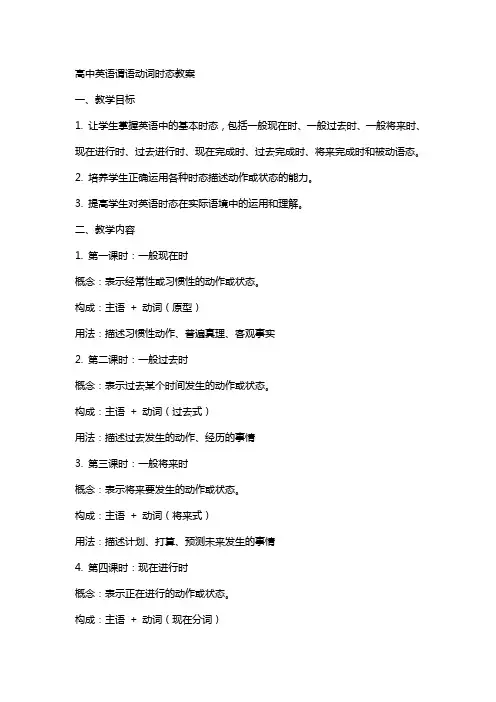
高中英语谓语动词时态教案一、教学目标1. 让学生掌握英语中的基本时态,包括一般现在时、一般过去时、一般将来时、现在进行时、过去进行时、现在完成时、过去完成时、将来完成时和被动语态。
2. 培养学生正确运用各种时态描述动作或状态的能力。
3. 提高学生对英语时态在实际语境中的运用和理解。
二、教学内容1. 第一课时:一般现在时概念:表示经常性或习惯性的动作或状态。
构成:主语+ 动词(原型)用法:描述习惯性动作、普遍真理、客观事实2. 第二课时:一般过去时概念:表示过去某个时间发生的动作或状态。
构成:主语+ 动词(过去式)用法:描述过去发生的动作、经历的事情3. 第三课时:一般将来时概念:表示将来要发生的动作或状态。
构成:主语+ 动词(将来式)用法:描述计划、打算、预测未来发生的事情4. 第四课时:现在进行时概念:表示正在进行的动作或状态。
构成:主语+ 动词(现在分词)用法:描述正在进行的动作、现阶段的状态5. 第五课时:过去进行时概念:表示过去某个时间正在进行的动作。
构成:主语+ 动词(过去分词)用法:描述过去某个时间正在进行的动作三、教学方法1. 采用直观演示法,通过动作、图片等展示时态的概念和用法。
2. 运用任务型教学法,让学生在实际语境中运用所学时态。
3. 采用分组讨论法,鼓励学生互相交流、合作学习。
四、教学步骤1. 引入新课:通过提问引导学生思考不间发生的动作或状态。
2. 讲解时态:分别讲解一般现在时、一般过去时、一般将来时、现在进行时、过去进行时的概念、构成和用法。
3. 实例展示:用PPT或板书展示典型例句,让学生理解并模仿。
4. 练习巩固:设计相关练习题,让学生动手实践,检测掌握情况。
5. 课堂小结:总结本节课所学时态,强调重点和难点。
五、课后作业1. 抄写本节课所学的典型例句,加深记忆。
2. 完成练习题,巩固所学时态。
3. 准备下一节课的预习内容。
六、第六课时:现在完成时概念:表示过去发生的动作对现在造成的影响或结果。
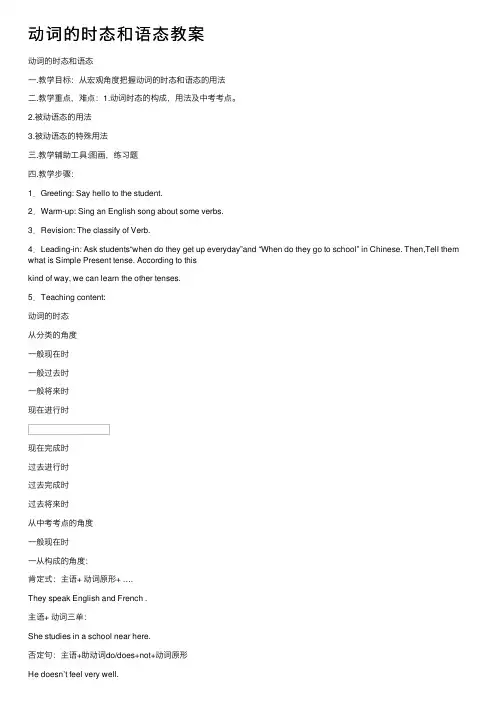
动词的时态和语态教案动词的时态和语态⼀.教学⽬标:从宏观⾓度把握动词的时态和语态的⽤法⼆.教学重点,难点:1.动词时态的构成,⽤法及中考考点。
2.被动语态的⽤法3.被动语态的特殊⽤法三.教学辅助⼯具:图画,练习题四.教学步骤:1.Greeting: Say hello to the student.2.Warm-up: Sing an English song about some verbs.3.Revision: The classify of Verb.4.Leading-in: Ask students“when do they get up everyday”and “When do they go to school” in Chinese. Then,Tell them what is Simple Present tense. According to thiskind of way, we can learn the other tenses.5.Teaching content:动词的时态从分类的⾓度⼀般现在时⼀般过去时⼀般将来时现在进⾏时现在完成时过去进⾏时过去完成时过去将来时从中考考点的⾓度⼀般现在时⼀从构成的⾓度:肯定式:主语+ 动词原形+ ….They speak English and French .主语+ 动词三单:She studies in a school near here.否定句:主语+助动词do/does+not+动词原形He doesn’t feel very well.⼀般疑问句: Do/does+主语+动词原形Do you speak English?回答: Yes,主语+do/doesNo,主语+don’t/doesn’t实义动词have当”有”讲时,疑问句有以下变化形式:Have you a penfriend?Do you have a penfriend ?Have you got a penfriend?特殊疑问句:特殊疑问词(where,when,how,why)+do/does+主语+动词原形(不⽤yes,no回答)Where does ZhouNan study?选择疑问句:Do you like this book or that one?⼆从⽤法的⾓度:1.表⽰经常性,习惯性的动作或经常存在的状态,常与always,often,usually,everyday,sometime等连⽤(通常⽤于be后,⾏为动词前)e.g.)Lei Feng is always ready to help other.I am always/usually go to school at 7 o’clock.2.表⽰普遍性的真理与规律The moon goes round the esrth.⽉亮绕着地球转.Light travels faster than sound.3.表⽰习惯与能⼒Do you drive a car? 你会开车吗?Mr Green teaches English.4.表⽰按规定,计划或安排预计要发⽣的动作或存在状态(主要⽤于come,go,leave,begin,start,arrive,return等瞬间动词)Could you tell me what time the plan leaves?Do you know what time the plan arrives in Moscow?5.在时间,条件状语从句中表⽰将来动作When you climb higher, you’ll find nothing grows there at all.Tom won’t feel well till the game is over.6.⼀般现在时表将来表最近的将来,说话⼈说话时动作并未发⽣,但即将开始(I’m off now .)或强调未来的事实和早已规定的事. ( Tomrrow is Sunday.)特殊⽤法⾓度:1.表⽰说话时刻,这⼀刻往往很短暂.What time is it now ?My watch says ten to seven.2.有些表⽰⼼理状态和感情,感觉的动词常⽤于⼀般现在时I feel better now.It doesn’t matter t his time .Does it hurn here?3 ⽤于下列句型中There goes the bell.Why don’t you go by bus?Why don’t/they/we +动词原形Why doesn’t he +动词原形Why not have a drink of tea?Here comes Jim..⼀般过去时⼀.从构成的⾓度:肯定式:主语+动词的过去式I wanted to watch animals in the zoo.They took his son to the cinema.否定式:主语+didn’t+动词原形I didn’t have his telephone number.⼀般疑问句:特殊疑问词+did+主语What sport did she play yesterday?⼀般过去时没有⼈称及数的变化⼆.从基本⽤法的⾓度:1.表⽰过去某时发⽣的动作或存在的状态.(常与其连⽤的时间状语有:yesterday ,the day before yesterday ,a moment ago ,just now ,in May, in 1999,lastnight/week/month/year ,once ,one day ,before… at the age of 18,when she was five…等)e.g.)He was a soldier two years ago.They had a baby last month.2.表⽰过去经常或反复发⽣的动作或⾏为(never ,often ,always)e.g.)They didn’t pass the ball often enough.He always took off his shoes and threw on the floor.3.根据时态⼀致,在宾语从句中⽤⼀般过去时代替⼀般现在时e.g.)She asked weather they needed some more tea.(瞬问的动作是过去,”需要”指现在)He said that there wasn’t time to go to the city century.过去了现在4.⽤于since从句,(主句的谓语动词为现在完成时,其后since从句为⼀般过去式)He has worked there since it opened in 1989.It has been two days since I came back.5.由于when,while,before,after,whenever等引导的表⽰过去时间的状语从句常⽤过去时.e.g.)The boy began to go to school when he was five.They lived there before they came to China.6.有些情况和事件,发⽣的时间不很清楚,但实际已发⽣,应当⽤过去时态.Look at the bags.They came.Five people died in the traffic accident.特殊⽤法的⾓度1.在时间,条件状语从句中表⽰过去将来的动作.If we won the match,we would be top.2.⼀般过去时形式上为过去时,实指现在I didn’t know you were th ere.(刚才不知,现在知道了.)⼀般将来时⼀:从构成的⾓度:肯定形式:主语+will+动词原形/主语+ Am/is /are +going to 动词原形否定形式:都是在will/am/is /are这些助动词后加not即可。
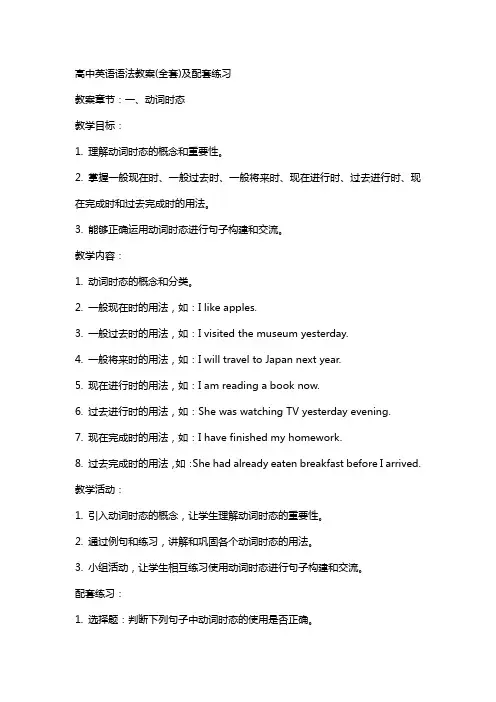
高中英语语法教案(全套)及配套练习教案章节:一、动词时态教学目标:1. 理解动词时态的概念和重要性。
2. 掌握一般现在时、一般过去时、一般将来时、现在进行时、过去进行时、现在完成时和过去完成时的用法。
3. 能够正确运用动词时态进行句子构建和交流。
教学内容:1. 动词时态的概念和分类。
2. 一般现在时的用法,如:I like apples.3. 一般过去时的用法,如:I visited the museum yesterday.4. 一般将来时的用法,如:I will travel to Japan next year.5. 现在进行时的用法,如:I am reading a book now.6. 过去进行时的用法,如:She was watching TV yesterday evening.7. 现在完成时的用法,如:I have finished my homework.8. 过去完成时的用法,如:She had already eaten breakfast before I arrived. 教学活动:1. 引入动词时态的概念,让学生理解动词时态的重要性。
2. 通过例句和练习,讲解和巩固各个动词时态的用法。
3. 小组活动,让学生相互练习使用动词时态进行句子构建和交流。
配套练习:1. 选择题:判断下列句子中动词时态的使用是否正确。
2. 填空题:根据语境,选择合适的动词时态填空。
3. 翻译题:将下列句子翻译成英文,注意使用正确的动词时态。
教案章节:二、名词和冠词教学目标:1. 理解名词的概念和重要性。
2. 掌握可数名词和不可数名词的用法。
3. 掌握定冠词和不定冠词的用法。
4. 能够正确运用名词和冠词进行句子构建和交流。
教学内容:1. 名词的概念和分类。
2. 可数名词和不可数名词的用法,如:apple (可数名词)和water (不可数名词)。
3. 定冠词和不定冠词的用法,如:The cat (定冠词)和a cat (不定冠词)。
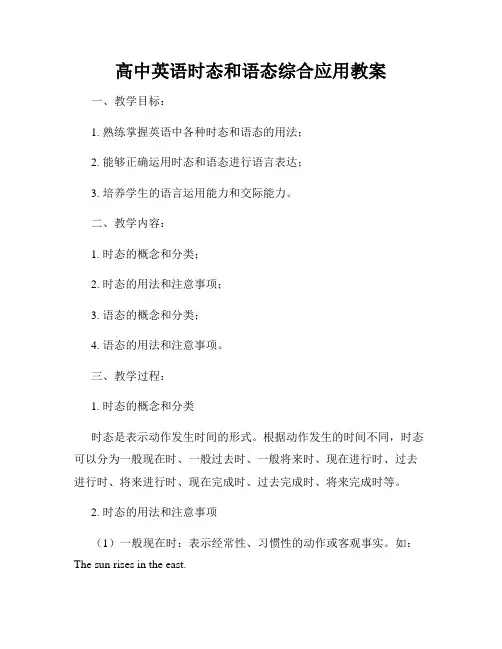
高中英语时态和语态综合应用教案一、教学目标:1. 熟练掌握英语中各种时态和语态的用法;2. 能够正确运用时态和语态进行语言表达;3. 培养学生的语言运用能力和交际能力。
二、教学内容:1. 时态的概念和分类;2. 时态的用法和注意事项;3. 语态的概念和分类;4. 语态的用法和注意事项。
三、教学过程:1. 时态的概念和分类时态是表示动作发生时间的形式。
根据动作发生的时间不同,时态可以分为一般现在时、一般过去时、一般将来时、现在进行时、过去进行时、将来进行时、现在完成时、过去完成时、将来完成时等。
2. 时态的用法和注意事项(1)一般现在时:表示经常性、习惯性的动作或客观事实。
如:The sun rises in the east.(2)一般过去时:表示过去发生的动作或存在过的状态。
如:He studied English last night.(3)一般将来时:表示将来某个时间将要发生的动作。
如:I will go to the cinema tomorrow.(4)现在进行时:表示现在正在进行的动作。
如:She is watching TV now.(5)过去进行时:表示过去某个时间正在进行的动作。
如:They were playing basketball at 5 p.m. yesterday.(6)将来进行时:表示将来某个时间正在进行的动作。
如:Shewill be working at the office tomorrow morning.(7)现在完成时:表示过去某个时间开始,一直持续到现在的动作或状态。
如:I have lived in this city for ten years.(8)过去完成时:表示过去某个时间之前已经发生或完成的动作。
如:He had finished his homework before supper.(9)将来完成时:表示将来某个时间之前已经完成的动作。
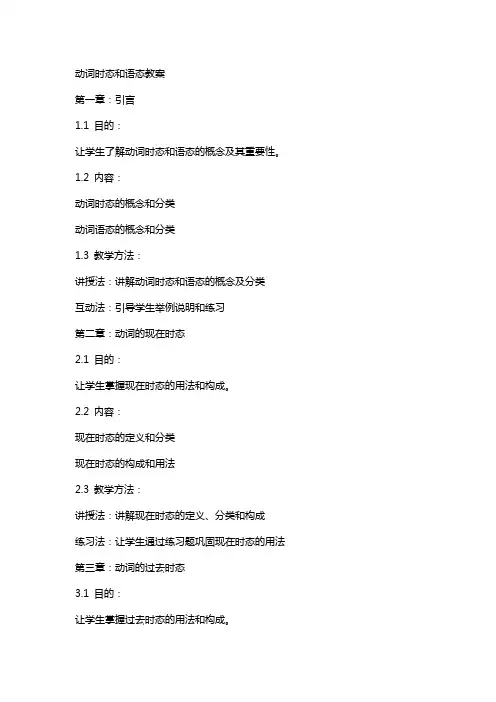
动词时态和语态教案第一章:引言1.1 目的:让学生了解动词时态和语态的概念及其重要性。
1.2 内容:动词时态的概念和分类动词语态的概念和分类1.3 教学方法:讲授法:讲解动词时态和语态的概念及分类互动法:引导学生举例说明和练习第二章:动词的现在时态2.1 目的:让学生掌握现在时态的用法和构成。
2.2 内容:现在时态的定义和分类现在时态的构成和用法2.3 教学方法:讲授法:讲解现在时态的定义、分类和构成练习法:让学生通过练习题巩固现在时态的用法第三章:动词的过去时态3.1 目的:让学生掌握过去时态的用法和构成。
3.2 内容:过去时态的定义和分类过去时态的构成和用法3.3 教学方法:讲授法:讲解过去时态的定义、分类和构成练习法:让学生通过练习题巩固过去时态的用法第四章:动词的将来时态4.1 目的:让学生掌握将来时态的用法和构成。
4.2 内容:将来时态的定义和分类将来时态的构成和用法4.3 教学方法:讲授法:讲解将来时态的定义、分类和构成练习法:让学生通过练习题巩固将来时态的用法第五章:动词的被动语态5.1 目的:让学生掌握被动语态的用法和构成。
5.2 内容:被动语态的定义和分类被动语态的构成和用法5.3 教学方法:讲授法:讲解被动语态的定义、分类和构成练习法:让学生通过练习题巩固被动语态的用法第六章:动词的进行时态6.1 目的:让学生掌握进行时态的用法和构成。
6.2 内容:进行时态的定义和分类进行时态的构成和用法6.3 教学方法:讲授法:讲解进行时态的定义、分类和构成练习法:让学生通过练习题巩固进行时态的用法第七章:动词的完成时态7.1 目的:让学生掌握完成时态的用法和构成。
7.2 内容:完成时态的定义和分类完成时态的构成和用法7.3 教学方法:讲授法:讲解完成时态的定义、分类和构成练习法:让学生通过练习题巩固完成时态的用法第八章:动词的完成进行时态8.1 目的:让学生掌握完成进行时态的用法和构成。
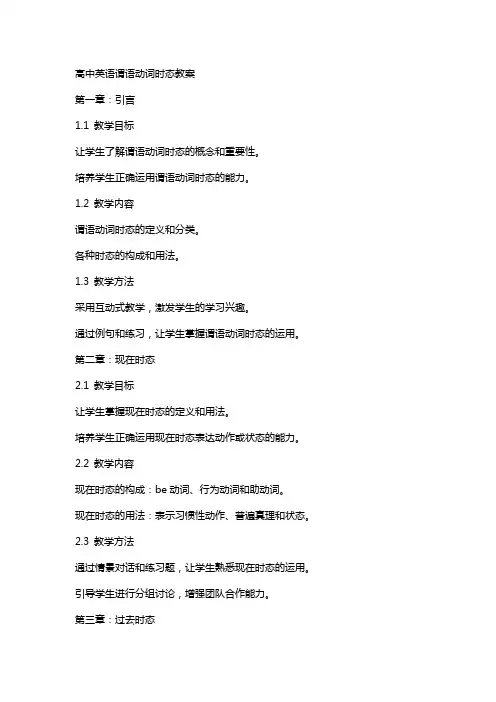
高中英语谓语动词时态教案第一章:引言1.1 教学目标让学生了解谓语动词时态的概念和重要性。
培养学生正确运用谓语动词时态的能力。
1.2 教学内容谓语动词时态的定义和分类。
各种时态的构成和用法。
1.3 教学方法采用互动式教学,激发学生的学习兴趣。
通过例句和练习,让学生掌握谓语动词时态的运用。
第二章:现在时态2.1 教学目标让学生掌握现在时态的定义和用法。
培养学生正确运用现在时态表达动作或状态的能力。
2.2 教学内容现在时态的构成:be动词、行为动词和助动词。
现在时态的用法:表示习惯性动作、普遍真理和状态。
2.3 教学方法通过情景对话和练习题,让学生熟悉现在时态的运用。
引导学生进行分组讨论,增强团队合作能力。
第三章:过去时态3.1 教学目标让学生了解过去时态的定义和用法。
培养学生正确运用过去时态表达过去发生的动作或状态的能力。
3.2 教学内容过去时态的构成:be动词、行为动词和助动词。
过去时态的用法:表示过去发生的动作和状态。
3.3 教学方法通过故事和练习题,让学生掌握过去时态的运用。
引导学生进行角色扮演,提高口语表达能力。
第四章:将来时态4.1 教学目标让学生掌握将来时态的定义和用法。
培养学生正确运用将来时态表达将来发生的动作或计划的能力。
4.2 教学内容将来时态的构成:will/shall + 动词原形、be going to和情态动词。
将来时态的用法:表示将来发生的动作和计划。
4.3 教学方法通过对话和练习题,让学生熟悉将来时态的运用。
引导学生进行预测和计划,培养思维能力。
第五章:复习和巩固5.1 教学目标复习和巩固学生对谓语动词时态的掌握。
提高学生运用不态进行表达的能力。
5.2 教学内容回顾现在时态、过去时态和将来时态的定义和用法。
通过练习题和任务,巩固学生对谓语动词时态的运用。
5.3 教学方法通过小组活动和游戏,激发学生的学习兴趣。
引导学生进行自主学习和合作学习,提高综合语言能力。
第六章:现在进行时态6.1 教学目标让学生理解现在进行时态的含义和用法。
英语动词时态讲解教案(5篇范文)第一篇:英语动词时态讲解教案英语动词时态讲解(共5课时)一:总述:动词的构成(5种)与时态(8种)二:分述:动词的构成 1.be 动词1)be动词的几种形式: am is arewas werebeingBeen 2)与名词、数词、形容词、介词连用 1)I am a doctor.2)He is ten.3)They are tired.4)The cat is under the table.3)There be 句型用于不可数名词和可数名词单数之前There is a pen on the desk.There is some water in the glass.用于复数名词之前 There are some sheep in the hill.用于一般将来时There is going to be a film in our school next Sunday.用于一般过去时 There was a book on the desk yesterday.注意:请根据时态和句中的名词选择适当形式。
4)Be 动词在时态中的运用在现在进行时中We are talking.在过去进行时中We were talking at this time yesterday 2.助动词1)几种形式1.do /don’t2.Does/ doesn’t3.Did/ didn’t4.will /won’t5.have haven’t /has hasn’t/had hadn’t 2)对句子进行否定和疑问1)Do you get up early every day? 2)I didn’t have lunch yesterday.3)Will you be back soon? 4)He hasn’t finished the work yet.在反意疑问句中5)He works in a school, doesn’t he? 6)She has never been there,has she? 在倒装句中7)They helped the farmers , so did we.8)I won’t visit thefamous singer,neither will he.3.情态动词共同特点: 情态动词后面跟动词原型,无论否定、疑问、倒装句、或反意疑问句都用情态动词1 只有时态变化,没有人称变化。
一、教案基本信息高中英语谓语动词时态教案范文课时安排:2课时教学目标:1. 让学生掌握英语中的基本谓语动词时态,包括一般现在时、一般过去时、一般将来时、现在进行时、过去进行时、现在完成时、过去完成时、将来完成时和现在完成进行时。
2. 培养学生运用谓语动词时态进行准确表达的能力。
3. 提高学生对英语时态在实际语境中运用的重要性认识。
教学内容:1. 谓语动词时态的定义和分类。
2. 各个谓语动词时态的构成和用法。
3. 谓语动词时态在实际语境中的运用。
教学方法:1. 采用任务型教学法,通过小组合作、讨论和实践等活动,让学生在实际语境中运用谓语动词时态。
2. 运用多媒体辅助教学,展示各种谓语动词时态的实例,增强学生的直观感受。
3. 采用问答、填空、翻译等练习方式,巩固学生对谓语动词时态的掌握。
教学步骤:1. 导入:通过播放一段英文视频或音频,引导学生关注其中的谓语动词时态。
2. 新课导入:介绍谓语动词时态的定义和分类。
3. 实例讲解:讲解各个谓语动词时态的构成和用法。
4. 实践环节:学生分组进行角色扮演,运用所学谓语动词时态进行对话。
5. 练习环节:设计相关的填空、翻译等练习题,巩固学生对谓语动词时态的掌握。
二、教学评价1. 课堂参与度:观察学生在课堂上的参与情况,包括发言、讨论、实践等。
2. 练习完成情况:检查学生完成练习的情况,包括正确性和完整性。
3. 小组合作:评价学生在小组合作中的表现,包括沟通能力、协作精神和创新能力。
4. 课后作业:布置相关的课后作业,巩固学生对谓语动词时态的掌握。
三、教学延伸1. 开展课外活动,如英语角、演讲比赛等,让学生在实际环境中运用谓语动词时态。
2. 推荐学生阅读英语时态相关的文章、书籍,加深对谓语动词时态的理解。
3. 组织英语电影欣赏活动,让学生关注电影中的谓语动词时态运用。
四、教学反思在课后,教师应认真反思本节课的教学效果,包括学生的学习兴趣、课堂氛围、教学方法等,以便在今后的教学中进行调整和改进。
动词时态教案一、教学目标1、让学生理解并掌握英语中常见动词时态的形式、用法和意义。
2、能够正确运用不同的动词时态进行口头和书面表达。
3、培养学生在实际语境中准确判断和使用动词时态的能力。
二、教学重难点1、重点一般现在时、一般过去时、一般将来时、现在进行时、过去进行时、现在完成时、过去完成时这七种时态的构成和用法。
各种时态在不同语境中的正确运用,以及时态之间的转换。
2、难点现在完成时与一般过去时的区别。
过去完成时的用法和理解。
时态在复合句中的运用,如宾语从句、状语从句中的时态一致性。
三、教学方法1、讲授法:讲解各个时态的基本概念、构成和用法。
2、练习法:通过练习题让学生巩固所学知识,加深对时态的理解和运用。
3、情景教学法:创设各种实际情景,让学生在具体语境中感受和运用动词时态。
四、教学过程1、导入通过展示一些包含不同时态的句子,如:“I play basketball every day” “I played basketball yesterday” “I will play basketball tomorrow” 让学生观察并思考这些句子中动词形式的变化,从而引出动词时态的概念。
2、一般现在时(1)构成:主语+动词原形(当主语为第三人称单数时,动词要加“s”或“es”)(2)用法:表示经常发生的动作或存在的状态;表示客观事实或普遍真理;表示主语的性格、能力、特征等。
(3)例句:He gets up at six every morning The earth moves around the sun3、一般过去时(1)构成:主语+动词的过去式(2)用法:表示过去某个时间发生的动作或存在的状态;表示过去经常或反复发生的动作。
(3)例句:I went to Beijing last year He often played football when he was a child4、一般将来时(1)构成:“will +动词原形”或“be going to +动词原形”(2)用法:表示将来要发生的动作或存在的状态。
高中英语《动词时态与语态总结》教案动词时态与语态总结I. 动词时态动词时态用来表达动作发生的时间,可以分为以下几种时态:1. 一般现在时 (Simple Present Tense)一般现在时用来表示经常性的、习惯性的或普遍的动作、状态或真理。
例如:Water boils at 100 degrees Celsius.The sun rises in the east.2. 现在进行时 (Present Continuous Tense)现在进行时用来表示现阶段正在进行的动作。
例如:I am studying for my exams.They are playing soccer in the park.3. 现在完成时 (Present Perfect Tense)现在完成时用来表示过去发生但对现在有影响的动作,或者强调动作的持续性。
例如:She has lived in this city for five years.We have finished our homework.4. 一般过去时 (Simple Past Tense)一般过去时用来表示发生在过去的某个具体时间的动作或状态。
例如:I visited my grandparents last weekend.They studied together in college.5. 过去进行时 (Past Continuous Tense)过去进行时用来表示过去某个时间段内正在进行的动作。
例如:She was watching a movie when I called her.They were playing basketball yesterday.6. 过去完成时 (Past Perfect Tense)过去完成时用来表示过去某个时间点之前已经发生的动作或状态。
例如:He had already eaten dinner when I arrived.They had finished the project before the deadline.7. 将来时 (Future Tense)将来时用来表示将要发生的动作或状态。
高中英语动词时态教案5篇教学中,备课是一个必不可少、极其重要的环节,备课不充分或者备得不好,会严重影响课堂的气氛和学生的积极性,一堂准备充分的课,会令学生和老师都获益非浅。
因此,平时,我紧抓备、教、改、辅、查等教学中的重要环节。
以下是我带来的高中英语动词时态教案内容,感谢您的阅读,希望能援助到您!高中英语动词时态教案1一.教材解读(Material Interpretation) 通常人们忌讳“只见树木,不见森林”,然而这里我们姑且就一个单元这只林片木来想象一下那片充盈神奇的森林。
从某种意义上说,这或许正是这套教材的编写者们的用意所在。
高一英语新教材的编写依然以单元为单位,但每个单元打破了呆板的块状设计,换之于流畅的线型流程,为课堂教学的灵活组织留下了更大的空间。
整个教材体现了municative Curriculum的指导思想。
每个单元以功能为主题,话题为支撑,结构为平台,任务为载体,意义交流为目的,充分体现了语言运用的基本思路,为任务型课堂教学构建了框架,注重提高学生用英语获取信息、处理信息、分析和解决问题的能力,发展学生与人沟通和合作的能力。
本单元的主题是Technology,中心话题为Hi-tech,话题本身具有强烈的时代气息,贴近学生的实际生活,符合学生的认知水平,在学生中有较强的认同感。
这一单元的交际功能项目(Functional Item)有两个:1. Describing things2. Expressing agreement disagreement。
结构项目(Structure)为The Present Continuous Passive Voice;主要能力项目为Reading 和Writing,其中一个阅读正篇,两个Language Input, 要求学生学会阅读并在阅读中培养根据上下文或构词法理判断词义的能力,同时学会写信并在信中阐述问题的症结,发表自己的观点。
拓展项目为如何运用高科技获取更多英语信息,提升英语学习,并探究科技为人类带来便利的同时可能存在的负面影响以及消除这些影响的解决办法。
高中英语谓语动词时态教案1. 教学目标•学生能够理解谓语动词的概念和在句子中的作用。
•学生能够掌握谓语动词的时态,包括一般现在时、一般过去时、现在进行时、过去进行时和将来时等。
•学生能够在实际运用中正确使用各种时态。
2. 教学内容•谓语动词的概念和作用。
•谓语动词的时态,包括一般现在时、一般过去时、现在进行时、过去进行时和将来时等。
•谓语动词时态的应用,包括句子的肯定和否定形式、疑问形式等。
3. 教学过程3.1 导入新课•教师介绍本节课的教学目标和教学内容,告诉学生本节课要学习谓语动词在句子中的作用以及时态的使用。
•教师可以给学生举一些简单的例子来引导学生理解谓语动词的概念和作用。
3.2 概念讲解•教师讲解谓语动词的概念,即在句子中表示动作或状态的动词。
•明确谓语动词在句子中的作用,即连接主语和宾语,表达句子的意思。
3.3 时态解析教师以一般现在时为例讲解时态的概念和用法,并引导同学分析时态形式和时态的含义。
现在时态表示现在正在进行的动作或状态,它的常见形式为“主语+动词原形+其他”。
例如:- 我看电视。
I watch TV.时态的要素有:- 时间点:现在- 动作/状态:看电视- 人称和数:我主谓一致规则:动词与主语在人称和数上要一致。
例如:- 你喜欢吃苹果吗?Do you like eating apples?- 她们学习很努力。
They study very hard.同学们可以模仿教师的讲解,在板书上记录各种时态的形式和含义:时态形式含义现在时主语+动词表示现在正在进行的动作或状态过去时主语+动词过去式表示过去发生的动作或状态将来时主语+will+动词表示将要发生的动作或状态现在完成主语+have/has+动词过去分词表示过去发生的动作对现在造成的影响过去完成主语+had+动词过去分词表示过去某个时间点前已经完成的动作3.4 练习与巩固•教师分发练习题,让学生在纸上或黑板上完成,检测学生对时态掌握的程度。
动词的时态和语态时态一般现在时(1)可表示客观真理、科学事实。
The sun rises in the east and sets in the west.太阳从东方升起,从西方落下。
(2)可用在由if,unless引导的条件状语从句,由even/if/though引导的让步状语从句,由when,before,until/till,as soon as,the moment引导的时间状语从句,由no matterwhat/who/when/where/how或whatever,whoever等引导的让步状语从句中,这时主句往往表将来或主句是祈使句。
I'll go with you as soon as I finish it.我一做完,就与你一同去。
Whatever you say,I will not change my mind.无论你说什么,我都不会改变主意。
一般过去时表示“刚才,在过去”之意,暗示现在已“不再这样”。
—Your phone number again?I didn't quite catch it.——再重述一下你的电话码好吗?我没记下来。
—It's 9568686.——是9568686。
一般将来时(1)“will+动词原形”表示事物的固有属性与必然趋势。
Fish will die without water.离开水,鱼就会死。
(2)“be going to+动词原形”可表示根据迹象对未来进行推断。
Look at the dark clouds.It is going to rain.看那乌云,要下雨了。
(3)“be about to+动词原形”表示立即的将来,很少与时间状语连用。
The train is about to start.火车就要开了。
(4)位移动词如e,go,arrive等,其一般现在时表按时间表将要发生的事,现在进行时可表计划、安排要做的事。
.I arrive in Beijing at 3∶00 p.m.tomorrow.明天下午三点我会到达北京。
He is ing.他将要来。
They are leaving for Tibet.他们将要去西藏。
(5)be to +动词原形①表示计划,安排。
When are you to leave for New York?你计划什么时候去纽约?②表示指令,相当于should。
You are to report it to the police.你应该把这事报告给警察。
③表示“打算,想要”。
If we are to be there before ten,we'll have to go now.若我们想在十点前到,我们现在就得走。
现在/过去进行时(1)表示现在或当时发展中的或正在进行的情况。
I first met Lisa three years ago,she was working at a shop then.我第一次遇见莉莎是在3年前,那时她正在一家商店工作。
—Hey,look where you are going!——嘿,看看你往哪儿走!—Oh,I'm terribly sorry.I wasn't noticing.——噢!非常抱歉!我没注意。
(2)表示反复出现的或习惯性动作,往往含有赞赏、厌恶、遗憾等情感,常与always,continually,constantly连用。
He is always thinking of others first.(表赞赏)他总是先为别人着想。
He is always making the same mistake. (表厌烦)他总是犯同样的错误。
(3)表示动作的未完性、暂时性。
我不是在此工作,I am just helping out until the new secretary arrives.;I don't really work here我只是在帮忙,新秘书来了我就走。
(暂时性)Selecting a mobile phone for personal use is no easy task because technology is changing so rapidly.选手机供个人使用不是一件容易事因为技术变化太快。
(“变化”尚未完成)(4)表示按计划、安排要做的事。
I've won a holiday for two days to Florida.I am taking my mum.我获得了一次去佛罗里达度两天假的机会。
我计划带着我妈妈去。
(计划)(5)表示现在或当时发展中的或正在进行的情况。
—Is this raincoat yours?——这是你的雨衣吗?—No,mine is hanging there behind the door.——不是,我的在门后挂着呢。
现在完成时(1)在条件、时间、让步状语从句中,表示将来某时以前已完成的动作。
I will not believe you unless I have seen it with my own eyes.除非我亲眼看到,我是不会相信你的。
Please don't get off the bus until it has stopped.车未停,请不要下车。
(2)It/This is/will be the first(last,second,third...)time that...和It/This is the best(worst,most interesting)+n.+that...结构的从句要求用现在完成时。
This is the first time that I've heard her sing.这是我第一次听她唱歌。
It's the best film I've ever seen.这是我所看过的最好的一部电影。
过去完成时(1)Hardly/Scarcely/Barely had...done...when;No sooner had...done...than...中从句用一般过去时。
Hardly had I got home when the rain poured down.我刚到家,天就下起了倾盆大雨。
No sooner had we started than the car got a flat tyre.我们刚出发,轮胎就爆了。
等,用过去完成时think,want,intend,mean,expect,hope表示愿望、打算类的词,如(2).表示过去未曾实现的愿望或意图。
I had meant to help you,but I was too busy at the moment.我本打算帮助你,但当时我太忙了。
现在完成进行时(1)表示一个从过去某时开始发生,一直延续到现在并可能延续下去的动作。
I've been waiting for an hour but she still hasn't e.我已等了一个小时,但她还没有来。
(2)表示动作刚刚结束(有时指出结果)。
My clothes are wet.I've been walking in the rain.我的衣服湿了,我一直走在雨中。
(3)表示重复(指断断续续,而非一直不停)。
She has been phoning Jim every night for the past two weeks.两个星期以来她每天晚上都给吉姆打电话。
语态被动语态使用要点不及物动词不能用于被动语态如appear,rise,die,happen,belong to,break out,take place等。
Great changes have been taken place in my hometown.(误)Great changes have taken place in my hometown. (正)我们家乡发生了巨大的变化。
表示状态的动词不用于被动语态如lack,fit,mean,hold,have,cost,contain,bee,last,possess,consist of,look like等。
The book costs 10 yuan.这本书花了10元钱。
What's bee of her?她怎么了?主动形式表被动的几种情况(1)某些感官动词和系动词后加形容词可以表示被动意义,如look,smell,taste,feel,prove,wear,sound等。
The flower smells sweet.花闻起来很香。
The dish tastes delicious.菜吃起来非常可口。
在主语是物的句子里,有些动词的主动形式可以表示被动意义,这些词后常有副词修饰。
(2).常用的这类动词有sell,read,write,wear,wash,open,clean,cook,keep,cut,fill,blow,measure,lock,run,record,begin,shut等。
This type of recorder sells well.这种型的录音机销路很好。
He doesn't photograph well.他不太上相。
This kind of shirt cleans easily.这种衬衫容易洗干净。
(3)动名词主动形式表示被动意义通常是事物(也可以是人)作want,need, require,deserve等动词的主语时,表示事物(或人)客观上“需要……”,用动名词一般式的主动形式作宾语表示被动意义。
若动名词是不及物的,后面还应有相应的介词。
The children need looking after.孩子们需要照看。
这种用法还可把动名词改为动词不定式的被动形式来表被动。
The children need to be looked after.(4)在作表语的某些形容词(easy,difficult,light,heavy,fit,good,safe,fortable,dangerous,pleasant等)后作状语用的不定式用主动形式表示被动意义。
She is easy to approach.她平易近人。
The rock is hard to break.这块岩石很难打碎。
不定式符to在被动语态中不可省略在主动语态中,如果感官动词和使役动词后的宾语补足语是动词,这个动词前往往不用to,但在被动语态中要带to。
I saw her pass by the window.我看见她从窗边经过。